Shelina Zahra Janmohamed's Blog, page 15
August 2, 2011
Ramadan Blog Post Day 1 (belated)
(This is a belated posting which I ought to have written up yesterday…)
Every year I mean to write a Ramadan series – something posted every day to track my progress, and share my thoughts. It is one of those tasks that as a writer I want to do to help me make sense of the month for myself, and to reflect on my feelings, experiences and actions. It is less about sharing lessons or morals, it's not about sermonising, but about unravelling some mysteries along the way. And if it resonates with others out there, then so much the better.
But of course (as life tends to be), I missed the boat. I wondered: should I not embark on the endeavour? It seemed already like a life lesson to be learnt. In previous years if I've missed the beginning, I wouldn't have bothered. This year, I'm trying a new tack: something better than nothing, better late than never. It's a day lost – but still (up to) 29 to go.
So here are my first thoughts, and structure for the rest of the month.
Qur'an count: first half juz.
Ramadan thought for the day: ooh, I like Ramadan!
Ramadan activities for today: try to call relatives to wish "Ramadan Mubarak."
I thought I'd also share this quote from Rumi: There is an unseen sweetness in the stomach's emptiness. We are lutes. When the soundbox is filled, no music can come forth. When the brain and the belly burn from fasting, every moment a new song rises out of the fire. The mists clear, and a new vitality makes you spring up the steps before you. Be empty and cry as a reed instrument. Be empty and write secrets with a reed pen. When satiated by food and drink, an unsightly metal statue is seated where your spirit should be. When fasting, good habits gather like helpful friends. Fasting is Solomon's ring. Don't give in to illusion and lose your power. But even when will and control have been lost, they will return when you fast, like soldiers appearing out of the ground, or pennants flying in the breeze.
July 30, 2011
Norway attacks can and must change the discourse on violence and extremism
Here is my op-ed for this week's The National.
The attacks of September 11 changed the nature of the discourse about the place of Muslims and migrants in the West. Last week's tragedy in Norway can and must change it again.
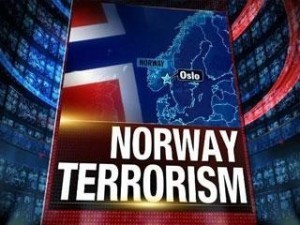 As soon as news of the Norway killings broke, commentators were quick to point a finger at Muslims, who after September 11 became highly visible, portrayed as inherently violent and intrinsically alien to western democratic values. With the discovery that the perpetrator was a 32-year-old white Norwegian, however, news coverage quickly moved on to focus on the "insane", "lone wolf" Anders Behring Breivik.
As soon as news of the Norway killings broke, commentators were quick to point a finger at Muslims, who after September 11 became highly visible, portrayed as inherently violent and intrinsically alien to western democratic values. With the discovery that the perpetrator was a 32-year-old white Norwegian, however, news coverage quickly moved on to focus on the "insane", "lone wolf" Anders Behring Breivik.
Nobody ate their words, nobody apologised for the presumption of Muslim guilt. One Norwegian official described the event as "our Oklahoma, not our World Trade Center". His analogy referred to white supremacism, but he inadvertently highlighted the double standard in collectivising responsibility across all Muslims when the perpetrator is Muslim, but confining it to the protagonist himself when otherwise. The analogy also illustrated the West's knee-jerk response to such terrorist attacks as having been carried out by Muslims, before considering any facts.
Facts have never got in the way of the right-wing's stoking of fear when it comes to Muslims.
After September 11 and the subsequent attacks in Europe, phrases such as "homegrown terrorism" and "the threat from within" were quickly coined. Emotive terms such as Eurabia, Londonistan and "creeping Islamisation" entered the language. Bearded brown men, burqa-clad women and angry chanting protesters were the accompanying visuals, painting a sensational and fearful picture of the West overrun by hordes of Muslims.
The right-wing repeated its mantra: Muslims were fundamentally incapable of adhering to liberal democratic values. Though this mantra may have been a fringe viewpoint when September 11 came, through sheer repetition it came to be accepted as mainstream wisdom. Big newspapers contributed to this feeding frenzy with continuing coverage of stories about Sharia courts, forced marriages and banning Christmas. Even leading politicians endorsed the cliché of "multiculturalism gone mad". Both the British prime minister and the German chancellor declared it a failure, and their policies characterised Muslims as nothing more than potential security threats.
Their sentiments were aided by policy wonks who supported with "facts" the claim that aspects of Muslim culture – at least those that did not integrate on their terms – provided the "mood music" and the "conveyor belt" for young Muslim radicalisation.
In many respects, the same discourse is taking place in reverse. The commentariat is grappling with the question: did right-wing commentators provide the mood music for this killer?
Breivik's manifesto enthusiastically cited the right-wing message. But those very commentators are now distancing themselves from the killer and protesting in the same vein as the Muslims they have tormented for so long: that the actions of one killer are not representative of their beliefs.
Among my Muslim friends there was of course horror and sadness, but also a sense of relief that it wasn't a Muslim perpetrator. You might consider it an unworthy emotion, but it was human, and understandable.
Indeed, there is even an uncomfortable sense of glee emanating from some quarters towards the right-wing, saying "we told you so" or, even more unworthy, that their "chickens have come home to roost".
This is not the time for triumphalism. What has brought us to this turning point is the loss of 77 innocent human beings.
The deaths should focus our collective mind to reset the terrorism narrative on a different, non-polarised trajectory.
This is the moment to subject previously unchallenged views to rigorous scrutiny.
This is also the moment for politicians who pander to an increasingly vocal and aggressive far right to reassess policies that deal with Muslims and to remove the lens that sees Muslims only as extremists, would-be extremists or mood musicians for extremism.
All those involved in the discourse around extremism and violence would do well to take away some big lessons from the past week to steer us away from the polarised trajectory we are on.
First, we must be more precise in the language we use for such incidents. Was Breivik a lone wolf or did he act in concert with other extremists? Was he a deranged psychopath or was he radicalised by right-wing sentiment? Just as it is not right to describe the September 11 perpetrators as "Muslim" terrorists, so it is not right to describe Breivik as a "Christian" terrorist.
Overturning the double standards in description will reduce grievances, but the crucial reason more accurate analysis is required is because these are essentially the same category of incident, and using the same language will allow us to better analyse the causes.
The same holds true for the idea of mood music, which needs reappraisal. Islam and non-violent Muslims are held responsible for the acts of criminal terrorists. By the same logic, does the right-wing press provide the mood music for actors like Breivik? The answer is not clear. However, the events in Norway should help us to better interrogate the merit of this theory. Can and will such commentators hold up their actions genuinely to test their own theory? Glib responses that because they are quoted by Breivik doesn't make them mood musicians won't hold – after all, those are precisely the claims they made against Muslims.
The presumption of innocence about Muslims also needs to be reinstated. "Facts" that see them as inherently alien or violent must be challenged. It will be harder to unravel the malicious discourse than it was to whip it up, but it must be overturned.
For every dubious poll that emphasises an alleged Muslim desire for separation – by instituting Sharia, or demanding special food or schools – we must be reminded of more reliable polls demonstrating a sense of Muslim belonging to western lands. Every statistic showing a Muslim propensity to violence must be countered by the real facts that political violence in the western world has been conducted more by non-Muslims.
The most challenging thing for politicians will be to face up to the fact that their own critiques of multiculturalism are remarkably similar to those of far-right extremists, though not as emphatic. If they critique multiculturalism, it must be based on fact, not the sensational headlines of a tabloid. It might be time to embrace the idea that multiculturalism, far from creating separate communities, is in fact a potent force to strengthen a country. That was the point made forcefully this week by Tarak Barkawi of Cambridge University. Writing for the think tank the Royal United Services Institute, he argued that multiculturalism can strengthen Britain's role as a world power.
Although I am calling for greater scrutiny of all these elements, it doesn't mean we should be complacent in our vigilance against those who commit violence in the name of Islam. They are violent criminals just like Breivik. Nor can we forget the innocent lives lost in Norway; our first thoughts and prayers must go to them.
Last week's horror has the potential to change the discourse again, away from the acceptable and even fashionable anti-Muslim sentiment that was stoked in the shadow of September 11. It gives us the opportunity to break free of this fear-mongering, and move towards a more robust, holistic and ideologically agnostic stand against all kinds of extremism.
July 29, 2011
The pious text message
This was my weekly column published last week in The National, when Ramadan was ten days away…
Ramadan is less than 10 days away, and it's time to get in the mood.
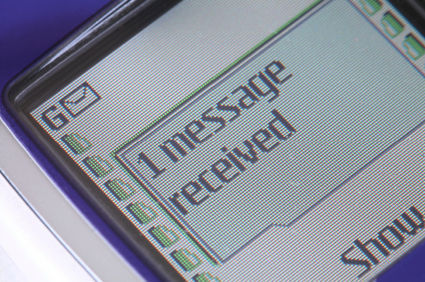 One of my favourite modern Ramadan traditions is the pious text message. Somebody somewhere (sometimes you don't even know who) really wants to help you in your religious devotion. And will spend money on messages to ensure you do.
One of my favourite modern Ramadan traditions is the pious text message. Somebody somewhere (sometimes you don't even know who) really wants to help you in your religious devotion. And will spend money on messages to ensure you do.
I think the pious text message is fabulous – a bite-size treat of religiosity designed to perk up the believer.
Are you in a boring work meeting? An unsolicited message will ping up to advise you never to despair of God's mercy. At the cinema? A quick SMS from an unrecognised number will remind you of the latest fund-raising dinner. Just managed to fall asleep after a hard day? You'll be glad you didn't turn your phone to silent, otherwise you would have missed the fifth message that night reminding you how to distribute your zakat payments.
This is a one-to-many activity. The rule of pious text message is that if the message you receive looks devout, it must be immediately forwarded to every Mulsim in your phone book. There's no need to check the content for accuracy – it's a pious text message!
The first Ramadan messages start arriving now to let you know, should you need reminding, that Ramadan is soon upon us.
Next up is the "has the moon been sighted?" frenzy. Messages go backwards and forwards, mostly contradicting each other about where, when, how and by whom the crescent moon that marks the start of Ramadan has or has not been seen.
Your devotion is then encouraged with verses of the Quran, reminders of what to say when breaking the fast, tips on where to go in the evenings; mosques, of course, not restaurants. And the frenzy peaks as the final 10 nights of Ramadan approach when your phone turns into a vibrating gremlin with "Remember us in your prayers" messages.
Finally, we reach the controversy on what day Eid should be celebrated and subsequent best wishes.
Luckily, the pious text message is not just for Ramadan. Special religious occasions will induce a flurry of prayers. Catastrophes trigger messages requesting donations. And of course Friday, the day of "jum'a" has its own round of "Jum'a Mubarak" wishes coupled with sayings of the Prophet.
What could be more wonderful than piety delivered direct to your phone?
Well, it seems some are ruffled by the "jum'a mubarak" text message turning into a weekly activity by the faithful, akin to a religious duty. It's unlikely in my view, as text messaging isn't mentioned in the Quran or hadith, but nonetheless they've posed their question to scholars, some of whom are of the view that this could be an "innovation" and therefore not permitted by Islam. Their scholarly response to the Friday Pious Text Message is to ensure messages are sent on other days also.
I do wonder who starts off the chains of messages. I've never created an original one, have you? But if you'd like to start a fresh line of distribution there are plenty of websites to give you ideas.
Remember, your messages are not just for the greater good of the faithful. They help keep the telecoms companies in business, too.
July 19, 2011
Happy half birthday, baby!
This was first broadcast on BBC Radio 2's "Pause for Thought". It's available for you to listen to until July 26th.
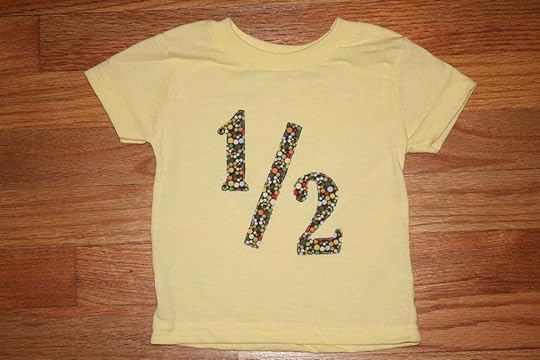
Today, my newborn baby is 6 months old. Even though I always loved children and babies, I was never a particularly maternal woman, never felt broody.
In my twenties, I travelled voraciously around the world, seeing as many places and people as I could afford on my graduate's salary.
The world is full of such wonders that I found it addictive – from the eerie Jordanian deserts, to the ancient history of Beijing, to the icy mystery of the glaciers of the Canadian Rocky Mountains. I was always on the lookout for love, for that special someone. But babies? No Thanks!
I did get married, and experienced the fulfillment of having a partner, a new experience after having lived an independent life till then. Yet I found myself reflecting more and more that what I hadn't yet experienced was the parent-child relationship. I felt a particular longing to do that not because I was broody for a baby, but because of the relationship I have with my own mother – something we've both worked hard to cultivate. I didn't want to miss out on that kind of intimate relationship.
In these first few months, my love for the little one has grown – I've experienced that fashionable thing called 'bonding'. But watching her first smile, her legs that wiggle in excitement, even the constant wake-ups in the middle of the night haven't just made me love her more, they've made me feel more compassionate and loving to my own parents. After all, they will have experienced the same sleepless nights, the same adoration of me as a baby, the same abandonment of their own priorities in order to cuddle, bathe and play with me.
The Qur'an tells us that "Wealth and children are the adornments of the life of this world" and it's true. The baby has certainly brought beauty and wonder to my life. I had travelled to far flung places to experience and explore the wonders of the universe. But – at the risk of sounding cheesy, it was not until the moment that I first held my baby that I realised that 'out there' – wherever that is – isn't the only place to find wonders. The intimate relationships which give love and definition to our lives are a wonder to be found much closer to home.
July 14, 2011
All that new mothers need is just one hour…
This was my weekly newspaper column published in The National last week.
Knowingly or unknowingly, we live our lives according to certain ratios. Our work-life balance is five to two: five days of work, and two of living at the weekend. Our sleep to awake ratio is around one in three. And, if you go to work, your daily productivity is around the same – eight working hours out of 24.
 Except when you have a new baby. My tiny five-month-old infant has taught me some new ratios. Once in every three hours she needs to be fed. She needs a nap in about the same measure.
Except when you have a new baby. My tiny five-month-old infant has taught me some new ratios. Once in every three hours she needs to be fed. She needs a nap in about the same measure.
My newest ratio is four in 24. I've worked out that as a new mum, I can only manage four hours of non-baby-related activity in any one day. Some of this is used up for work, as I work from home. Some of it is used up in household chores like cooking, cleaning, laundry and admin. And some for the necessary fabric of life, like phone calls to family and friends to see how they are doing.
The rest is all baby, baby, baby. Baby needs feeding, nappy changing, entertaining, stimulating, comforting. When she's cute (and she is) it is hard to work and not play with her instead. When she's grumbling (and she does), her complaints – which sound like the hard drive on your computer when it's about to crash, but at 10 times the volume – grind my inner core to the point where I cannot bear it for more than a few seconds. It's a God-given talent of babies to be able to make a noise that can instantaneously command your attention.
The four hours of productivity are hard won, cobbled out of minutes extracted here and there. On a good day, I can benefit from a few minutes of her watching her mobile turning above her, although she likes to attack the flying toys now that she can reach. Or she might happily sit up and turn the pages of her books, which in her mind are not just for reading, but also for eating. And blessed are the days when she lies on her playmat and quietly observes the details of her surroundings.
There is one thing I look forward to more than anything else now, but it is rare. All I want is an hour of time entirely to myself, no baby, no crying, no feeding, nothing. Just me.
Unless you've been a new mum (or are a very supportive new dad), I think it's hard to appreciate the sheer joy of an hour of quiet mummy-time. On an unexpectedly good day, baby's daytime nap stretches to this amount of time. Or, if a kindly relative is present to play with baby, that too gives mummy some time on her own.
Sometimes I use the hour for my own nap. Sometimes it is surprisingly enjoyable to have an uninterrupted hour to clean the house. And sometimes, it is incredibly stimulating to be able to find the woman that you once were – and to lose yourself in your work. That time becomes one of intense pleasure and sheer happiness, an hour in which you are no longer "mummy" (even my husband calls me that now). It is an hour to do something that makes you who you are. If you know a new mum, the best possible gift you can give her is an hour of time to be herself.
My time is up: I can hear baby crying as she wakes up from her nap. Now it's back to being a mummy …
June 17, 2011
No sex-slaves please, we're Muslim
This was my newspaper column in last week's National in the UAE. It is a response to a video posted by a female politician in Kuwait where the protagonist says that men should have sex-slaves in order to protect themselves against the sins of fornication and adultery. See my thoughts below.
Muslim women rarely talk about sex in public. To do so is considered by the cultures they inhabit – not by Islam – as one of the great taboos. So what on earth possessed Salwa al Mutairi, a failed politician from Kuwait, to declare 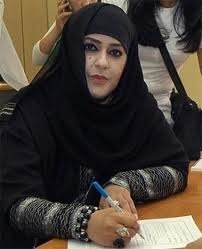 that female "sex-slaves" were a solution to meet the needs of lusty Kuwaiti husbands?
that female "sex-slaves" were a solution to meet the needs of lusty Kuwaiti husbands?
According to Al Mutairi, Kuwait is jam-packed with men whose excessive virility means they are aroused to a frenzy by the sight of female domestic help wielding a vacuum cleaner or stacking a dishwasher. Her solution to their uncontrollable libidos: buy women from war-stricken countries to be their sex-slaves. She suggests Chechnya, where female prisoners of war are in plentiful supply, and who will be grateful for being saved from starvation.
Predictably her comments have been seized upon by Islamophobes. And no wonder. She's managed to wrap up every possible stereotype of Muslims into one mind-boggling story: men who treat women as possessions; oppressed wives; women who buy into the worldview that men are there to be satisfied at all costs and that the Arab desire for conquest is still rampant. And she's quoted some "specialists of the faith" to make it look as though this is a religious position that all Muslims hold.
Here's what I think of Al Mutairi's views: bonkers.
Her opinion is about as representative of Muslim thinking as the Pope is a Muslim. That is to say, not at all. Yet because she feeds into existing prejudices, she has received wide coverage. It's a bit Sarah Palin: all hype and no sense.
Just to be clear, Muslims don't condone the buying and selling of women, or any human beings. We're opposed to it. Islam doesn't see men as ravaging sex-beasts, rather men should treat their wives with compassion and respect. Muslims are not out to conquer the world, or take prisoners of war. Instead, Islam counsels peace and harmony with its neighbours, and that Muslims should act as a refuge for those who have been afflicted by war.
Of all the craziness that props up Al-Mutairi's strange notions, the one that really bothers me is that men are beholden to uncontrollable lust. And that's a notion that pervades both eastern and western cultures. Let's get rid of the idea that men are hostages to their libido once and for all.
I'm fed up with excuses rolled out for men that they are so feeble and lacking in self-discipline that they are incapable of controlling their sexual desire. But, strangely they are not incapable of being the head of a household or running a country. My view: if men can't control what's in their pants, then their argument that they should control society is on pretty shaky ground.
Men who have power and wealth believe that they can treat women as possessions; that "manly' men who are overloaded with testosterone must inevitably engage in affairs. Al-Mutairi's views fit into this same power and lust paradigm as the Dominique Strauss-Khans of this world, or the Arnold Schwarzeneggers. It's the same wrong-headed thinking that sees women in war as legitimate targets for abuse through the wielding of power and sex, as we've seen in the recent allegations that Qaddafi used rape as a weapon of war.
Let's get away from this sleazy, skin-crawling, dirty tone that sees women as sex objects. It's a pernicious paradigm that men as well as women must challenge. And no taboo should hold us back from saying so.
June 5, 2011
An absurd proposal: what if men weren't allowed to drive?
This is my weekly newspaper column published yesterday in The National (UAE).
 With all the recent media coverage of women not being permitted to drive in a certain Middle Eastern country, I got thinking – what would it be like if men weren't allowed to drive?
With all the recent media coverage of women not being permitted to drive in a certain Middle Eastern country, I got thinking – what would it be like if men weren't allowed to drive?
I came to one simple conclusion: we women would be much safer.
Think about the dangers of male drivers. Men have higher rates of speeding, they are involved in more accidents and cause more deaths on the road. Their high-testosterone brains ignite higher incidences of road rage. They are notorious tailgaters, failing to observe any measure of safe stopping distance. And, they can't even be bothered to ask directions when lost. The solution is simple: bar them from driving.
If men start to whine and whinge about their "rights" being infringed, then just to stop their "waagh waagh waagh" moaning, consider this modest proposal.
Driving lanes could be segregated by gender. Or, better still, we introduce gender-segregated streets, some for men, and some for women. This way, we women would not have to look at the horror of their balding heads, especially those of middle-aged drivers in convertibles, their toupees or comb-overs flapping in the wind.
By limiting their access to certain streets, we would also be safe from their high-speed antics and reckless driving, which, due to their biological design, they are compelled to engage in. They can't help it, poor things. Have petrol, will accelerate.
Where there are roads that men insist they need access to (although what kind of roads these could be, I just don't know – perhaps ones with football stadiums on them?), a timetable could be devised with restricted hours for men to use them at essential times only. Of course, these hours would exclude the times that the men ought to be at home putting out the rubbish, fixing shelves or cleaning out the drains.
Segregated lanes, limited access and a timetable could be combined into a new road system based on Gender Prioritisation and Separation (GPS).
Male drivers are genetically predisposed to road rage, and if we are to permit them to drive, then we must warn them they will only have themselves to blame if they are attacked in any altercation that ensues. Not driving is for their own good, so if they choose to ignore this, they must bear the consequences.
Of course, we must ensure that these male drivers are not a source of temptation for women. And even more importantly we must take steps to prevent them from driving willy-nilly around on frivolous activities like collecting the children from school, caring for sick relatives or attending places of employment to earn wages to buy food.
In fact, now that I think about it, these tasks are entirely trivial and the men can manage them quite comfortably by hiring a female chauffeur to drive them around. If they are in the back, then they won't be able to use their wiles to tempt the poor female driver.
When it comes down to it, I am of the view that men don't really want to drive, but they think it's fashionable to say that they do. I mean, why would they bother with the hassle of parking? Why get hot under the collar trying to navigate traffic?
In short, men are simply not designed to drive. We tell them and tell them that driving is not good for them, and it's not good for society. But that's typical of men isn't it: they just won't listen.
May 29, 2011
Edgware Road, Global Icon
This is my weekly newspaper column published in Abu Dhabi for The National.
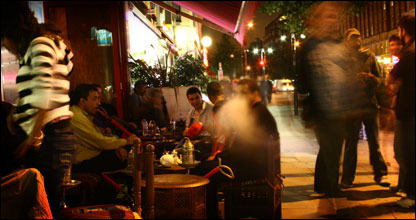 Edgware Road greets you first with its fragrance. The sweet mellow caramel scent wafts gently along the street, invisibly kissing your clothes, and claiming you long after you return home.
Edgware Road greets you first with its fragrance. The sweet mellow caramel scent wafts gently along the street, invisibly kissing your clothes, and claiming you long after you return home.
Its every paving stone seemingly filled with shisha smokers, Edgware Road runs between Marble Arch and the Marylebone flyover in central London. Some call it Little Beirut or Little Cairo. Once it may have needed these namesakes as reminders of home for the Arab migrants who came to London as early as the 19th century as a result of increased trade with the Ottoman Empire; or the Egyptians in the 1950s, the Lebanese during the civil war, or the Iranians and Algerians after periods of unrest. Whether it is the mix of nationalities and cultures, the British setting or some other factor, Edgware no longer needs an alter ego. It stands as a global icon.
As a Londoner, I visit Edgware Road regularly. The area is always busy, from the Odeon Cinema where Edgware Road meets the arch, past the various sonorously named Ranouches, Marouches and Fattoushes. The eateries, which are part of such large chains as Costa Coffee, Caffe Nero and McDonald's, feel different here than elsewhere. Veiled female customers chide children. "Mohammed!" "Fatima!" They stop running around. With customers spilling onto the streets until late in the night, it seems even Middle Eastern opening hours prevail. Some of the little shwarma outlets open their doors only as evening starts to set in, as their trade is most ebullient once the young men and women swarm along the road at night, chatting, eyeing, laughing, smoking, sipping.
Outside the summer months, these pavements and restaurants are populated by young hip things, usually Muslim, coming for a halal night out. They race their cars in the frosty November air for Eid al Adha, the men sporting Indian sherwanis and interspersing Arabic street slang in their conversations, the women in colourful Indian clothes, their veils tossed fashionably over their hair. On the weekends, Muslims congregate for shai bi na'na and a shared puff of the scented smoke.
This is the time of year when Edgware bursts into activity as visitors from the Gulf migrate to the fashionable London district to escape the summer heat. As dusk falls, women in achingly glamorous abayas glide along the road, the smell of bukhoor trailing them. Young men gesticulate as they speak on their mobiles arranging the evening's activities with friends. Fathers march forward furiously, wives and offspring in their wake.
Londoners watch as Edgware Road is taken over, and we, its main actors for most of the year, are overlooked. Are we invisible to the visitors, we wonder? Spend a little time to get to know the local culture and people, we cry.
One of the great charms of Edgware Road is the variety of cultures, languages and ethnicities that populate it. Once, it may have been Little Arabia, but today if you cast your gaze around any cafe you will observe faces, clothing and dialects from as far as China, through Somalia and Sudan, across the Middle East, to North Africa, Europe and the Americas. Edgware Road may have its roots in another world, but now it has its own persona.
I say to those visiting: take a moment to look at its history, its present and its people today. Edgware Road's microculture hints at an intriguing global multicultural future for the Arab and Muslim worlds.
May 27, 2011
Neither Bin Laden nor dictatorships: Arab youth choose their own models of leadership
This is a very belated posting of my weekly newspaper column written the week that Osama Bin Laden was killed in Pakistan.

Courtesy of Cartoonmovement.com
Osama bin Laden is dead. Bogeyman of western nightmares, and a figure of revulsion for many Muslims, his death brings to a close the ghoulish and virtual reign of an icon – loathed and despised, but an icon nonetheless – of leadership.
This is not to say he was a leader to be emulated, simply that he held a degree of influence. Witness the Royal Islamic Strategic Studies Centre based in Jordan, which placed him on its list of 500 Most Influential Muslims under the category "Radicals".
His death comes during sweeping changes in the Middle East. Bin Laden wanted these populations to rise up under his charge against the West, but they did it without him. Mubarak is gone. Ben Ali, too. Qaddafi fights for survival. The Arab people didn't want them, and they didn't want bin Laden, his philosophy consigned to a compound in Pakistan, his influence diminishing, his ideology rejected by the very people he sought to lead and who on the streets wanted the very democracy he reviled.
But what kind of leadership do Arabs, particularly young Arabs, actually want?
The urge for "participation and representation in the political life of their country of residence" remains a "priority" for young Arabs, according to Asda'a Burson Marsteller's survey of 2,500 Arab youths in 10 countries, conducted during the recent events. "Arab youth have a deep and enduring desire for democracy" was one of their conclusions, obvious in light of events.
This change is self-driven. The youth are resigned to the fact that their current – and outgoing – leaders do nothing for them. Few bother to voice their opinions to public officials, according to the fourth Silatech Index "Voices of Young Arabs", published in March, of 20 countries and 36,000 people and produced jointly by the Gallup Centre for Muslim Studies and Silatech, a social enterprise addressing opportunities for young Arabs. They are not convinced their leaders are maximising the potential of young people. Instead, they wish to determine their own lives. This trend is clear in Egypt, Iraq, Jordan, Syria, Lebanon and Morocco.
OgilvyNoor, the Islamic branding and marketing consultancy division of the Ogilvy & Mather advertising firm, calls the movers and shakers of the current changes "futurists", who are "fearless" and "vocal in their beliefs".
"Their worldview is fundamentally meritocratic, backed by their faith in Islam's principles of equal brotherhood. Authority is not solely top-down any more. It must make room for equal dialogue," writes Nazia Hussain, head of strategy for the unit.
It is worth noting that the drive for self-determination, the desire for democracy and the demand that leaders should engage in dialogue are derived from Islam. Additionally, 70 per cent of "futurists" are extremely proud to be Muslim, according to OgilvyNoor's research.
These young people have come of age in the shadow of September 11 and Osama bin Laden. The war on terrorism offered them two mutually exclusive choices: western democracy or bin Laden's toxic leadership. They have rejected this bipolar caricature, instead creating their own models of leadership for their future: a future that takes pride in both Islam and democracy, a future fuelled by their belief that change is up to them, a future they can and will make happen.
May 22, 2011
The Blue Screen of Death has come for me
This is my weekly newspaper column for The National (UAE) published yesterday.
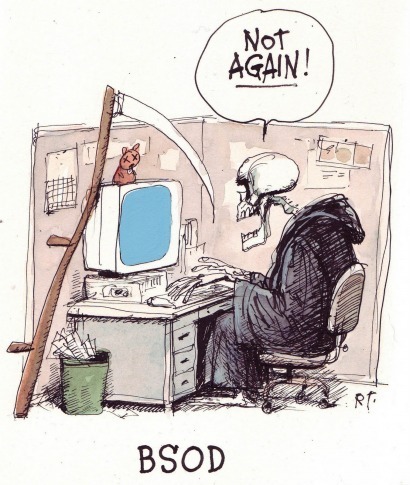
cartoon by Richard Thompson
The Blue Screen of Death came a'knocking at my door this week. The gruesome bright azure of his face, the hissing finality of his breath and the blankness of his unapologetic gaze are his hallmarks, and he used them to stare me straight in the eye. My computer was no more.
I was in the middle of an innocuous task, when suddenly everything froze. I wiggled my mouse, first in annoyance, then frustration, then fear. No. Please. No, I muttered to myself. Not now. Please not now.
My eyes grew wider, and I could feel tears pricking the corners of my eyes. My heart beat faster and my fingers started to twitch. This couldn't be happening to me. I had a top of the range laptop. I hadn't installed any bootleg software. I hadn't been browsing anywhere off the beaten track. I was a good girl as far as my computer life went.
So why was this bad thing happening to me?
The Blue Screen blinked at me. "If this is the first time you are seeing this screen …" it said. Phew. It was the first time. So, I rebooted. I even used "Safe Mode". As a non-techie I congratulated myself on not just knowing that Safe Mode exists, but that I knew how to access it. There on my screen I could see all my files and documents, and even the piece of writing that I had been working on, whose potential loss was causing me to panic.
Just as my palpitations subsided, the computer started whirring, like the shutting down of the last power station on earth. It hummed, then roared like a lion seeing its cubs about to be attacked, and suddenly it vanished into a void. The Blue Screen disappeared. No goodbyes, no warning, no "nice to have met you". And with it, my latest work – literally – was sucked into the ether. Goodbye, computer. Goodbye, Shelina.
The Urban Dictionary, which is like Wikipedia but for street speak, has as its top definition of the Blue Screen of Death as "Microsoft's most successful program". Ha ha. I'm not laughing. There is even the claim that the Blue Screen's name itself was a joke: the "blue" referring not just to the colour of the error screen but also to IBM in whose operating system the screen had first appeared, and which industry followers called "Big Blue." It's still not funny.
In the past two weeks, computer geeks who have had access to beta versions of Microsoft's Windows 8 have been saying that the Blue Screen is no more, and the kiss of computer death has become black.
This is top-notch geek-gossip. Black might be a more appropriate colour to signal the demise of your beloved, but it's less of a visual shock.
The geeks say the use of black by Microsoft is clever, because it will allow them to retain the BSOD abbreviation. Some even say they will miss the Blue Screen of Death. Strange, masochistic fools.
What I miss is having a computer that works. Now I will have to call technical support to perform a resurrection. The operative will have just the slightest whiff of condescension at my lack of technical knowledge. Have you tried switching it off and on again? He will ask.
If he does, this time the response will be my own blue scream of bloody murder. Just make it work. Just make the pesky thing work.
Shelina Zahra Janmohamed's Blog
- Shelina Zahra Janmohamed's profile
- 175 followers





